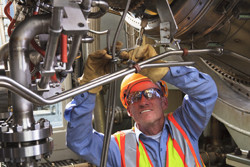Optimising aero-engine combustion system
Combustion systems exploiting stratified flames are stable with low pollution and are excellent candidates for aero-engines. However, greater understanding of the effects of mixture stratification on emissions and combustion instabilities is required. The scientific network of academia and industry partners established with funding of the project IAPP-STRATEGI investigated related topics both experimentally and theoretically. Studies of the detailed structure of turbulent stratified flames produced data needed for validation of turbulent combustion models. Fellows also studied the response of flames to acoustic perturbation experimentally and theoretically. Given the sound waves associated with aero-engine function, such studies provided important information on stratified flame behaviour under operating conditions. Finally, laser and imaging techniques have been used to obtain high-resolution fuel velocity measurements when ejected from industrial spray nozzles. The IAPP-STRATEGI network has enhanced EU capabilities in aero-engine design, advanced the careers of promising scientists and led to new project collaborations regarding related issues. The EU investment in the project proposal will thus have continued and lasting impact.



